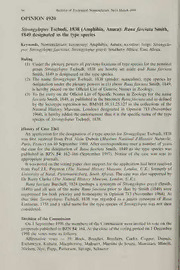
Opinion 1920 Strongylopus Tschudi, 1838 (Amphibia, Anura): Rana fasciata Smith, 1849 designated as the type species PDF
Preview Opinion 1920 Strongylopus Tschudi, 1838 (Amphibia, Anura): Rana fasciata Smith, 1849 designated as the type species
94 Bulletin ofZoological Nomenclature 56(1) March 1999 OPINION 1920 Strongylopus Tschudi, 1838 (Amphibia, Anura): Ranafasciata Smith, 1849 designated as the type species Keywords. Nomenclature; taxonomy; Amphibia; Anura; ranidae; frogs; Strongylo- pus; Strongylopusfasciaiiis; Strongylopus grayii; Southern Africa; East Africa. Ruling (1) Undertheplenarypowersallpreviousfixationsoftypespeciesforthenominal genus Strongylopus Tschudi, 1838 are hereby set aside and Rana fasciata Smith, 1849 is designated as the type species. (2) The name Strotigylopus Tschudi, 1838 (gender: masculine), type species by designation under the plenary powers in (1) above Ranafasciata Smith, 1849, is hereby placed on the Official List ofGeneric Names in Zoology. (3) To the entry on the Official List of Specific Names in Zoology for the name fasciataSmith, 1849, as published in thebinomen Ranafasciataand asdefined BMNH by the lectotype (specimen no. 58.11.25.127 in the collections ofthe Natural History Museum, London) designated in Opinion 713 (November 1964), is hereby added the endorsement that it is the specific name ofthe type species ofStrongylopus Tschudi, 1838. History ofCase 2361 Anapplicationforthedesignation ofatypespeciesforStrongylopusTschudi, 1838 was first received from Prof Alain Dubois (Museum National d'Histoire Naturelle, Paris. France) on 10 September 1980. After correspondence over a number ofyears the case for the designation of Ranafasciata Smith, 1849 as the type species was published in BZN 54: 162-166 (September 1997). Notice of the case was sent to appropriatejournals. Itwasnotedonthevotingpaperthatsupport fortheapplication had beenreceived from ProfJ.L. Poynton {The Natural History Museum. London. U.K.; formerly of UniversityofNatal. Pietermaritzhurg. South Africa). Thecase was also supported by Dr Barry Clarke {The Natural History Museum. London. U.K.). Ranafasciata Burchell, 1824 (perhaps a synonym of Strongylopus grayii (Smith, 1849)) and all uses of the name Ranafasciata prior to that by Smith (1849) were suppressed for both priority and homonymy in Opinion 713 (November 1964). At that time Strongylopus Tschudi. 1838 was regarded as a junior synonym of Rana Linnaeus, 1758 and a valid name for the type species ofStrongylopus was not then considered. Decision ofthe Commission On 1 September 1998 the members oftheCommission were invited to vote on the proposalspublishedin BZN54: 164. At thecloseofthevotingperiodon 1 December 1998 the votes were as—follows: Affirmative votes 19: Bock, Bouchet, Brothers, Cocks, Cogger, Dupuis, Eschmeyer, Kabata, Macpherson, Mahnert, Martins de Souza, Mawatari, Minelli, Nielsen, Nye, Papp, Patterson, Savage, Schuster Bulletin ofZoological Nomenclature 56(1) March 1999 95 — Negative votes 1: Stys. No votes vk-ere received from Lehtinen. Kerzhner, Kraus and Song. Heppell and Ride were on leave ofabsence. Original references The followingaretheoriginal referencestothenameStrongyhpusTschudi. 1838 placedon theOfficial List, and to theendorsement forRamifcisciulaSmith, 1849on theOfficial List, by the ruling given in the present Opinion: fii.sciatii. Rami. Smith. 1849, Ilhislralions ofthezoologyofSouth Africa. Reprilia, pi. 78, text. StrongyhpusTschudi, 1838,MemoiresticlaSocietedcsSciencesNalurellesdeNeuchcilel,2:38, 78-79. (Issued in the serial in [1839] but published as a separate in 1838). The following is the reference for the designation of the lectotype of Rami fasciata Smith, 1849: International Commission on Zoological Nomenclature. 1964. Opinion 713. BZN 21: 352.
